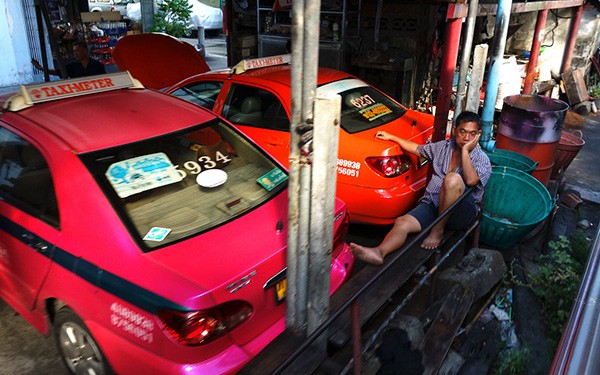I have had some bad experiences with Thai cabs.
On Vibhavadi Rangsit road a driver saw red and I watched helplessly from the back seat as he overtook cars at insane speeds in order to give someone a piece of his mind. I’ve been refused fares countless times.
Down on Phuket and Samui I’ve been told a 3km drive costs 500 baht because a cartel runs the show.
I once got in a cab on Ladprao road (north Bangkok) and asked to be taken to Bang Khae (west Bangkok) and when I looked up from my book thirty minutes later was on the road to Suvarnabhumi (east Bangkok). It was the driver’s first day on the job.
So it was with some consternation that I read Thai authorities are cracking down on ridesharing apps like Uber. The director-general of the Land Transport Department said Uber is “destroying the public transport system in the area”.
This statement is telling, because if anything is being destroyed it’s the patience of Bangkokians who are no longer willing to put up with the shoddy service of the status quo. After all, consumers aren’t fools and tend to avoid patronising poor services.
For the authorities, it seems, the public transport system doesn’t exist to serve the public, the public exists to serve the transport system.
This week some London-based friends of mine were in Thailand. When I met them in the UK last summer we travelled almost everywhere in Uber cars. It was my first time to use such a service and I was astonished by the convenience of it all. Cars were spotless and punctual, drivers supremely professional. The absence of cash and the sheer efficiency of the whole thing was thrilling, like we had arrived in the future.
I didn’t realise until after those Uber experiences in London how frustrating relying on taxis in Bangkok can be.
While in Bangkok this week my friends used Uber around ten times. Every experience was flawless. On their first morning in the city they made three attempts to organise transport from Asok, where their hotel was. The first time they hailed a regular meter taxi. The driver refused to drive them to their destination, waving his hand and laughing as if they were insane for asking. The second time they again hailed a regular meter taxi. He wanted a flat fee off the meter, asking for 400 baht because, well, that’s what you do to farang tourists in Asok. The third time they got an Uber.
That’s not how things should work. When a better service comes along the public should have the right to avail of it. Otherwise would we not still have Luddites rioting in the streets over the existence of sewing machines?
One friend told me that Uber now plays a significant role in his choice of holiday destinations. If it’s a toss-up between two cities — one that has Uber and one that doesn’t — he will choose the Uber city. That’s how big a deal this is, and it’s something I completely understand.
Arriving in a new city can be challenging enough but huge, sweltering cities like Bangkok are particularly hard to navigate by foot, meaning that as a tourist you are at the mercy of confusing ticket machines in subways and train stations, rip-off cab drivers and bus networks bewildering in their scale. Uber, and services like it, grant people much more control over their manoeuvrability in a new place.
On their last night in Bangkok I met my friends at Rot Fai market. They tried to take a normal cab back to their hotel at the end of the night. I saw them refused twice yet again and they were forced to call an Uber; the meter taxis left them with no other choice. After the conversation we had had this was comically frustrating. When my friends left I tried to take a taxi home. The driver wanted 150 baht for a 60 baht journey.
I will admit that outside the tourist areas and before a certain time at night most taxi drivers are honest and I seldom have issues. I also think they are due a raise. But unpredictability is always present. You just don’t know what you’re going to get.
And in a country with some of the most dangerous roads in the world it would be nice to have the option of a seatbelt in meter taxis, yet this is rarely afforded.
The attacks on Uber are especially galling because even when consumers want to use normal taxis they are being refused. My friends wanted to give regular taxis some business and they couldn’t do it, turned down by the drivers themselves. Yet these same taxi drivers who refuse fares, mostly consequence-free, want companies that will accept them shut down.
For years meter taxi drivers have been busy making their bed. Only now are they realising what it’s like to lie in it.
Featured image is by m-louis .® (CC BY-SA 2.0 licence)


